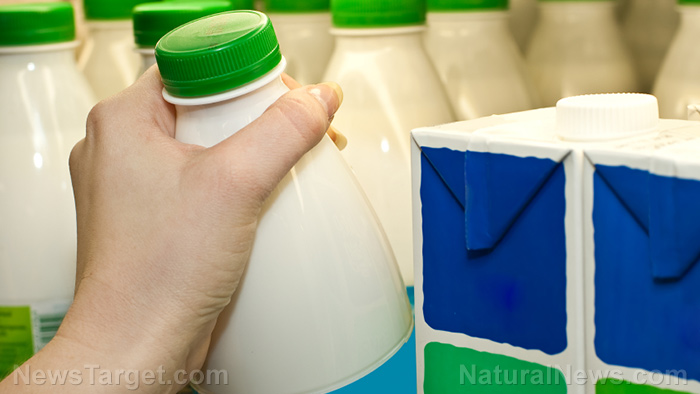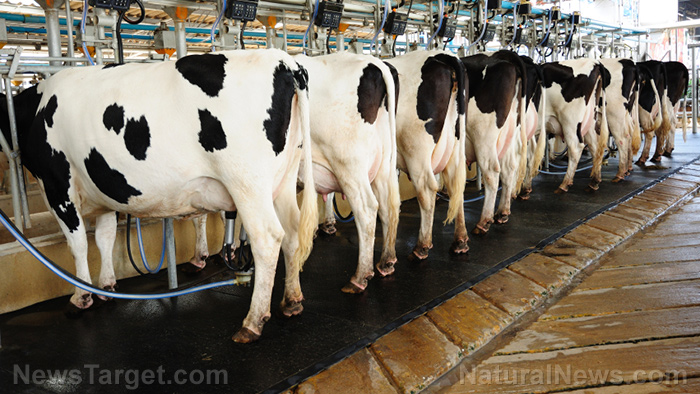
In order to conform to the climate change narrative and abide by carbon mandates put forth by the globalists, one company started using a supplement that causes their dairy cows to produce 30% less methane gas. That supplement is shrouded in controversy.
A Danish firm named Arla recently announced they are feeding their cows a supplement called Bovaer. The supplement contains a chemical compound called 3-nitrooxypropanol, or 3-NOP for short. This chemical interferes with natural processes in the cow’s gut, reducing methane emissions when the cows’ fart.
This news is not being received well by consumers in Great Britain. Many people are beginning to boycott Arla milk products and other associated companies that use 3-NOP in their dairy cows.
Brits boycotting over a dozen Arla dairy products over toxicity concerns
Brits are now boycotting over a dozen Arla dairy products, claiming that certain products are “contaminated” by 3-NOP. Many of the claims link the chemical to infertility and cancer, and boycotts are spreading on the internet fast. The boycott includes Arla’s milk and butter products, including Lurpak and Anchor butters as well as Castello, an artisan cheese brand, and Apetina, a brand of cooking cheeses.
The boycott extends to other companies that partner with Arla Foods, including Yeo Valley, Starbucks, McDonald's and Ecomilk, and encompasses entire supermarkets, including Tesco an Asda, which stock Arla’s brands. Subordinate brands are also being targeted by the boycott, including: Arla Cravendale, which is a filtered milk; Arla B.O.B., a fat free milk; Arla Protein, a high protein yogurt and drink brand; and Arla Lactofree, a dairy product that is free of lactose.
One TikTok video, which has been viewed thousands of times, shows a consumer pouring Arla milk down the sink, while saying, “Arla not in my house.”
The Good Food Project called for a full boycott of “soulless supermarkets and fake food corporations” such as Arla.
Another video, viewed over 1.6 million times, shows a man pointing to a bottle of Asda semi-skimmed milk that is sourced from Arla farms. In the video, he says, “This will be going straight down the drain and I won't be buying Asda milk again.”
Widespread experimentation on dairy cows using 3-NOP faces controversy
As consumers reject these dairy products, Arla has tried to reassure the public that the feed additive has been declared safe by both European and UK regulators. The company claims that the supplement breaks down into natural byproducts and doesn’t transfer into the cow’s milk. Additionally, Arla reports that there are no studies linking 3-NOP to cancer or infertility through indirect routes of exposure.
However, consumers point to a warning by the US Food and Drug Administration (FDA) which says 3-NOP is not to be used in humans. Arla iterates that the feed supplement is not used directly in humans and is safe as a feed additive because it never incorporates into the cow’s milk.
Consumers also point out that the FDA cautions consumers about handling the product: “3-nitrooxypropanol may damage male fertility and reproductive organs, is potentially harmful when inhaled, and is a skin and eye irritant.” The FDA warning also warns farmers to wear protective gear for the eyes, mouth, and hands when working directly with the supplement. Arla iterates that this is standard protocol for handling most feed supplements.
The Food Standards Agency in the UK also slapped a warning label on the product, linking the product to cancer. The study behind this warning involves high doses of the chemical and investigates its effect on rodent populations. In the study, high doses initially increased cancer risk in female rats; however, a follow up analysis found that the cancer rates were not statistically higher in the 3-NOP or control group. Still, questions remain about the chemical’s effect on the cow’s microbiome long term.
While 3-NOP is generally considered safe, mass experimentation on the food supply over the issue of natural methane gas emissions would not be worth the potential consequences, if the product were to affect cows’ milk supply or damage human health over the long term.
Sources include:
Please contact us for more information.















